
Security News
Research
Data Theft Repackaged: A Case Study in Malicious Wrapper Packages on npm
The Socket Research Team breaks down a malicious wrapper package that uses obfuscation to harvest credentials and exfiltrate sensitive data.
An integrated large-scale model training system with efficient parallelization techniques
Colossal-AI: Making large AI models cheaper, faster, and more accessible
Access high-end, on-demand compute for your research instantly—no setup needed.
Sign up now and get $10 in credits!
Limited Academic Bonuses:
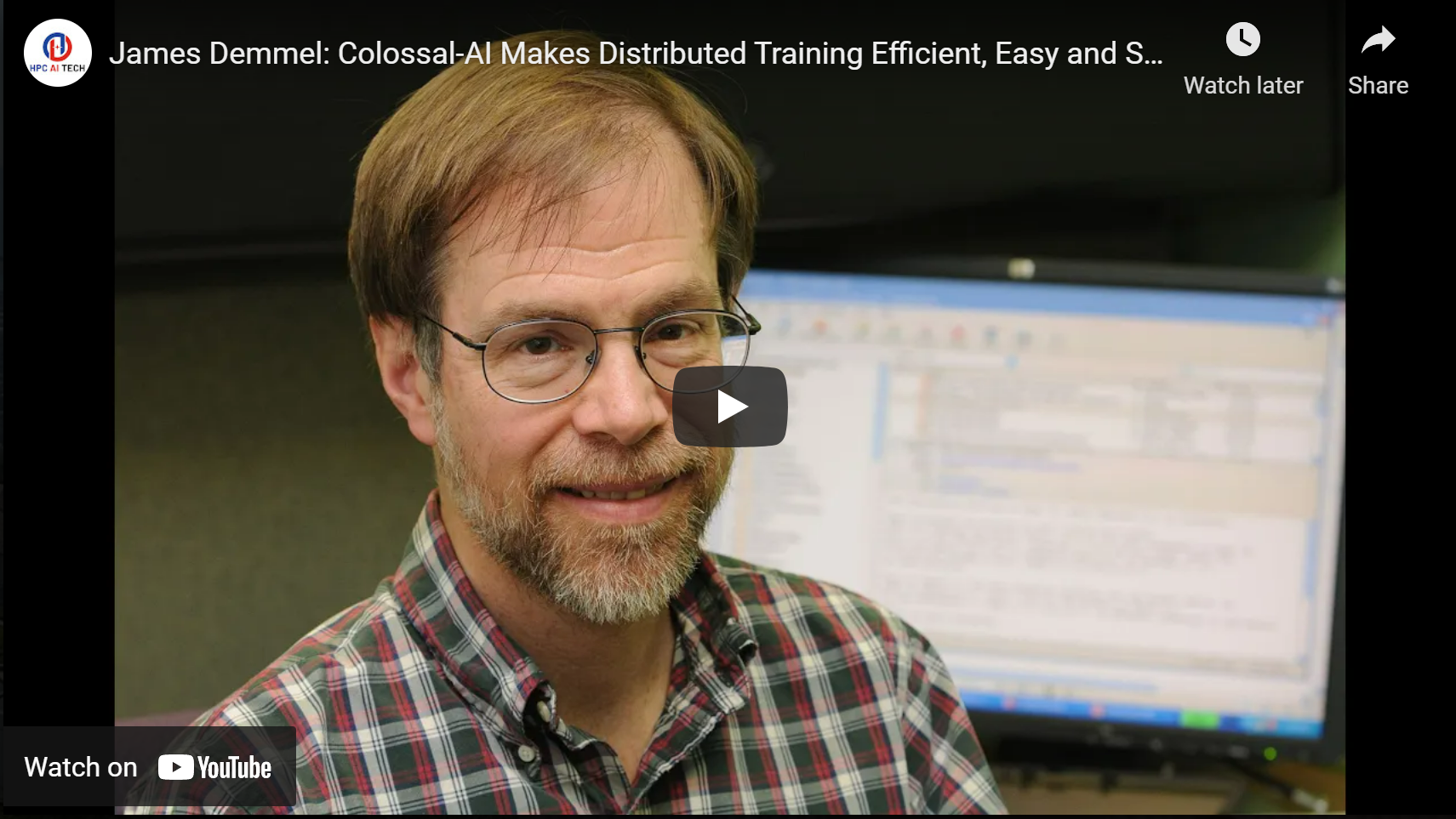
Prof. James Demmel (UC Berkeley): Colossal-AI makes training AI models efficient, easy, and scalable.
Colossal-AI provides a collection of parallel components for you. We aim to support you to write your distributed deep learning models just like how you write your model on your laptop. We provide user-friendly tools to kickstart distributed training and inference in a few lines.
Parallelism strategies
Heterogeneous Memory Management
Friendly Usage
Open-Sora:Revealing Complete Model Parameters, Training Details, and Everything for Sora-like Video Generation Models [code] [blog] [Model weights] [Demo] [GPU Cloud Playground] [OpenSora Image]
[GPU Cloud Playground] [LLaMA3 Image]
7B: One half-day of training using a few hundred dollars yields similar results to mainstream large models, open-source and commercial-free domain-specific LLM solution. [code] [blog] [HuggingFace model weights] [Modelscope model weights]
13B: Construct refined 13B private model with just $5000 USD. [code] [blog] [HuggingFace model weights] [Modelscope model weights]
| Model | Backbone | Tokens Consumed | MMLU (5-shot) | CMMLU (5-shot) | AGIEval (5-shot) | GAOKAO (0-shot) | CEval (5-shot) |
|---|---|---|---|---|---|---|---|
| Baichuan-7B | - | 1.2T | 42.32 (42.30) | 44.53 (44.02) | 38.72 | 36.74 | 42.80 |
| Baichuan-13B-Base | - | 1.4T | 50.51 (51.60) | 55.73 (55.30) | 47.20 | 51.41 | 53.60 |
| Baichuan2-7B-Base | - | 2.6T | 46.97 (54.16) | 57.67 (57.07) | 45.76 | 52.60 | 54.00 |
| Baichuan2-13B-Base | - | 2.6T | 54.84 (59.17) | 62.62 (61.97) | 52.08 | 58.25 | 58.10 |
| ChatGLM-6B | - | 1.0T | 39.67 (40.63) | 41.17 (-) | 40.10 | 36.53 | 38.90 |
| ChatGLM2-6B | - | 1.4T | 44.74 (45.46) | 49.40 (-) | 46.36 | 45.49 | 51.70 |
| InternLM-7B | - | 1.6T | 46.70 (51.00) | 52.00 (-) | 44.77 | 61.64 | 52.80 |
| Qwen-7B | - | 2.2T | 54.29 (56.70) | 56.03 (58.80) | 52.47 | 56.42 | 59.60 |
| Llama-2-7B | - | 2.0T | 44.47 (45.30) | 32.97 (-) | 32.60 | 25.46 | - |
| Linly-AI/Chinese-LLaMA-2-7B-hf | Llama-2-7B | 1.0T | 37.43 | 29.92 | 32.00 | 27.57 | - |
| wenge-research/yayi-7b-llama2 | Llama-2-7B | - | 38.56 | 31.52 | 30.99 | 25.95 | - |
| ziqingyang/chinese-llama-2-7b | Llama-2-7B | - | 33.86 | 34.69 | 34.52 | 25.18 | 34.2 |
| TigerResearch/tigerbot-7b-base | Llama-2-7B | 0.3T | 43.73 | 42.04 | 37.64 | 30.61 | - |
| LinkSoul/Chinese-Llama-2-7b | Llama-2-7B | - | 48.41 | 38.31 | 38.45 | 27.72 | - |
| FlagAlpha/Atom-7B | Llama-2-7B | 0.1T | 49.96 | 41.10 | 39.83 | 33.00 | - |
| IDEA-CCNL/Ziya-LLaMA-13B-v1.1 | Llama-13B | 0.11T | 50.25 | 40.99 | 40.04 | 30.54 | - |
| Colossal-LLaMA-2-7b-base | Llama-2-7B | 0.0085T | 53.06 | 49.89 | 51.48 | 58.82 | 50.2 |
| Colossal-LLaMA-2-13b-base | Llama-2-13B | 0.025T | 56.42 | 61.80 | 54.69 | 69.53 | 60.3 |
ColossalChat: An open-source solution for cloning ChatGPT with a complete RLHF pipeline. [code] [blog] [demo] [tutorial]
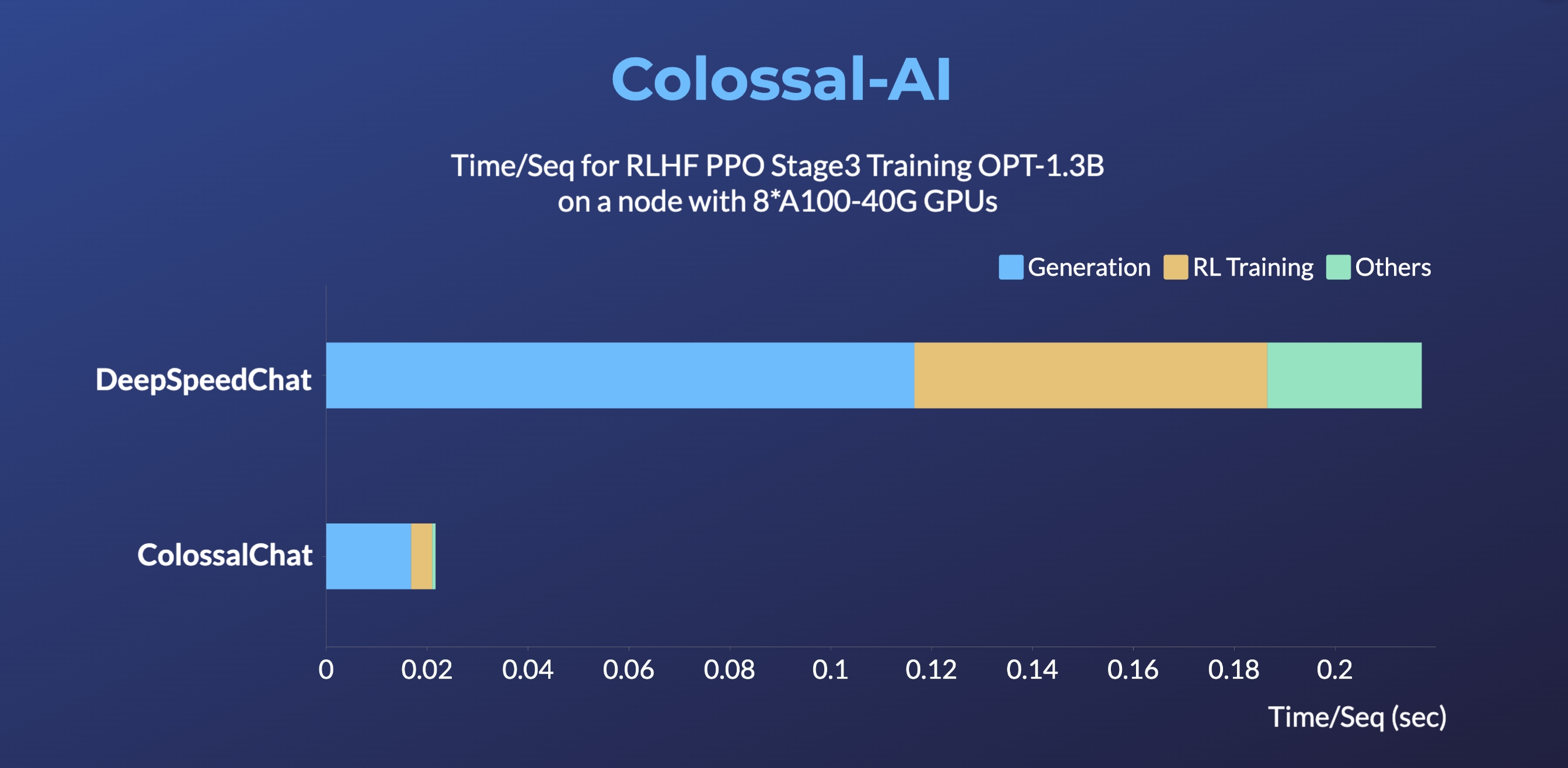

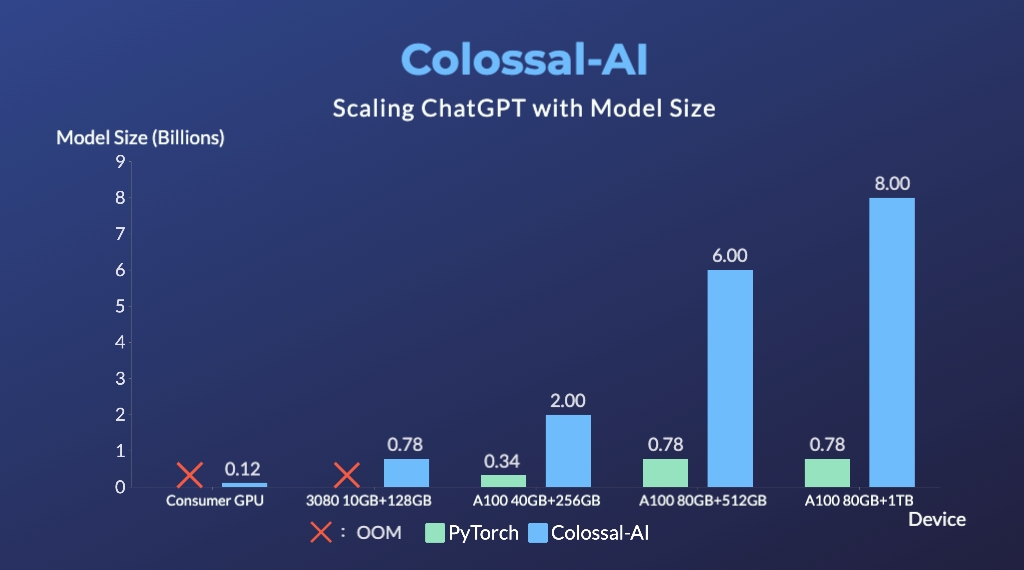
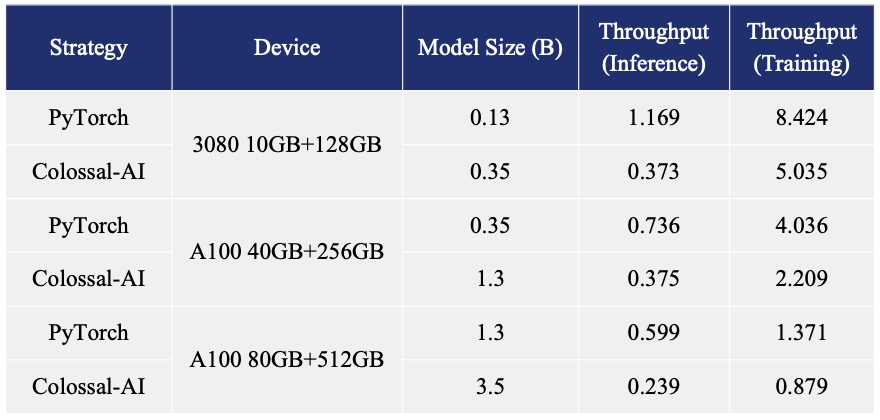
Acceleration of AIGC (AI-Generated Content) models such as Stable Diffusion v1 and Stable Diffusion v2.
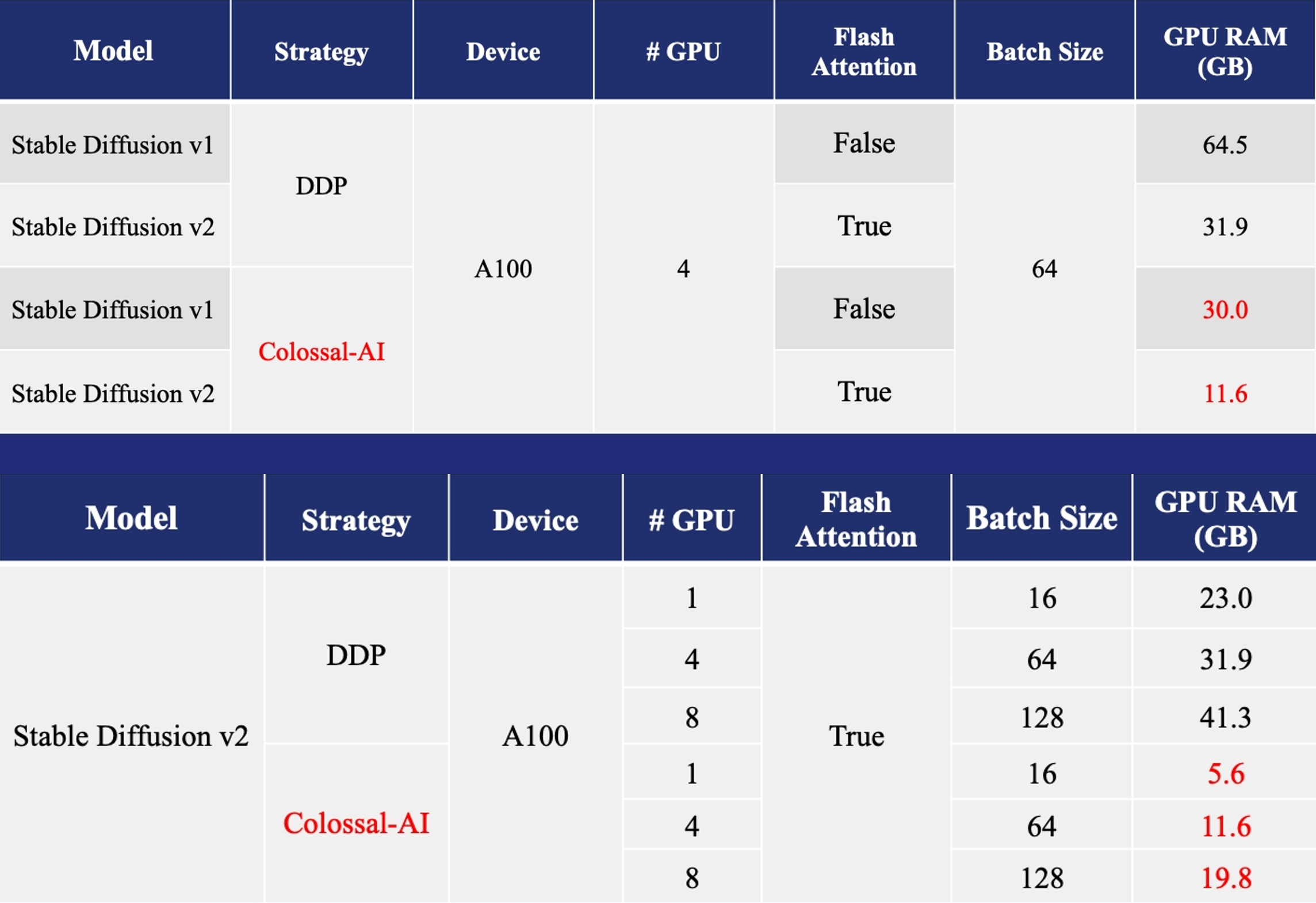


Acceleration of AlphaFold Protein Structure

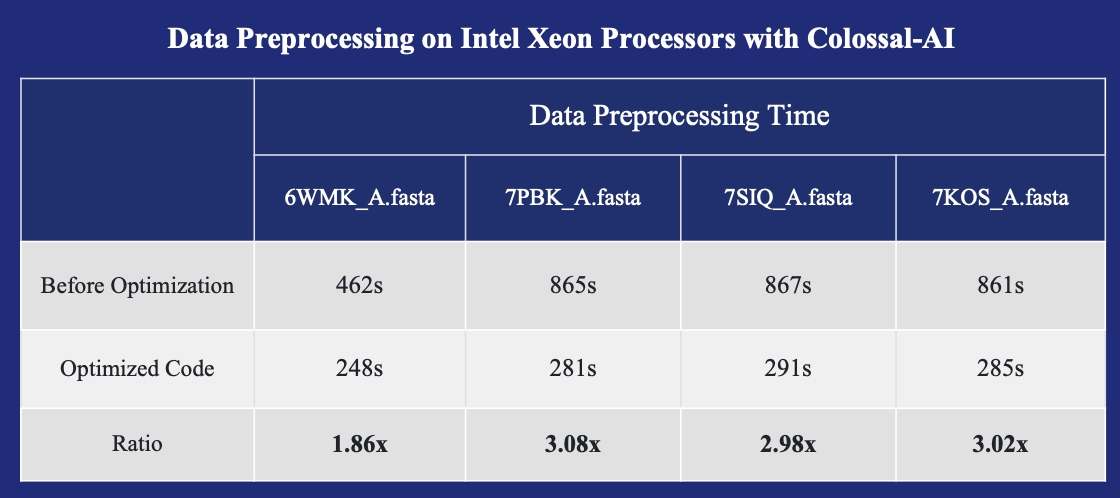

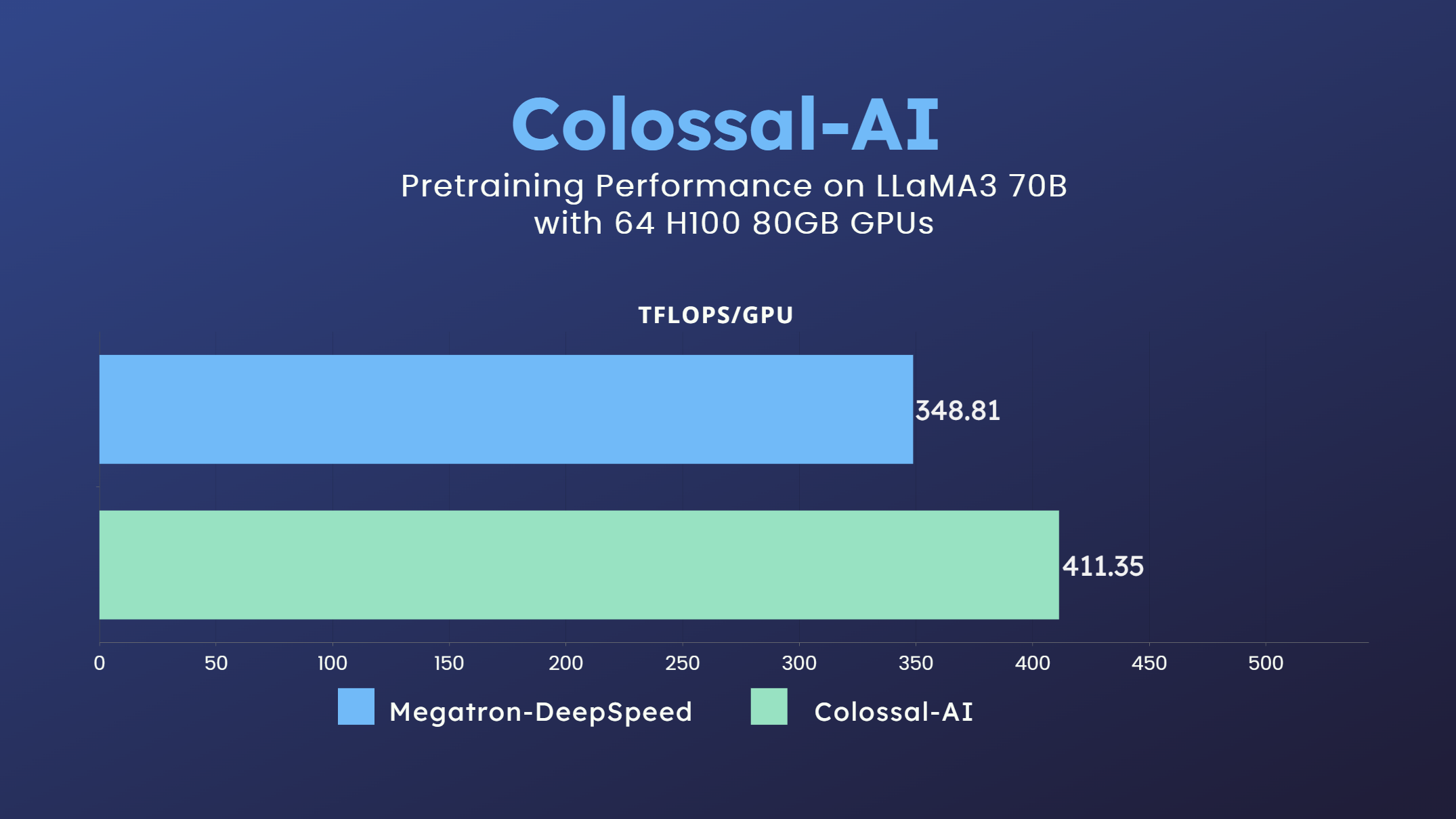
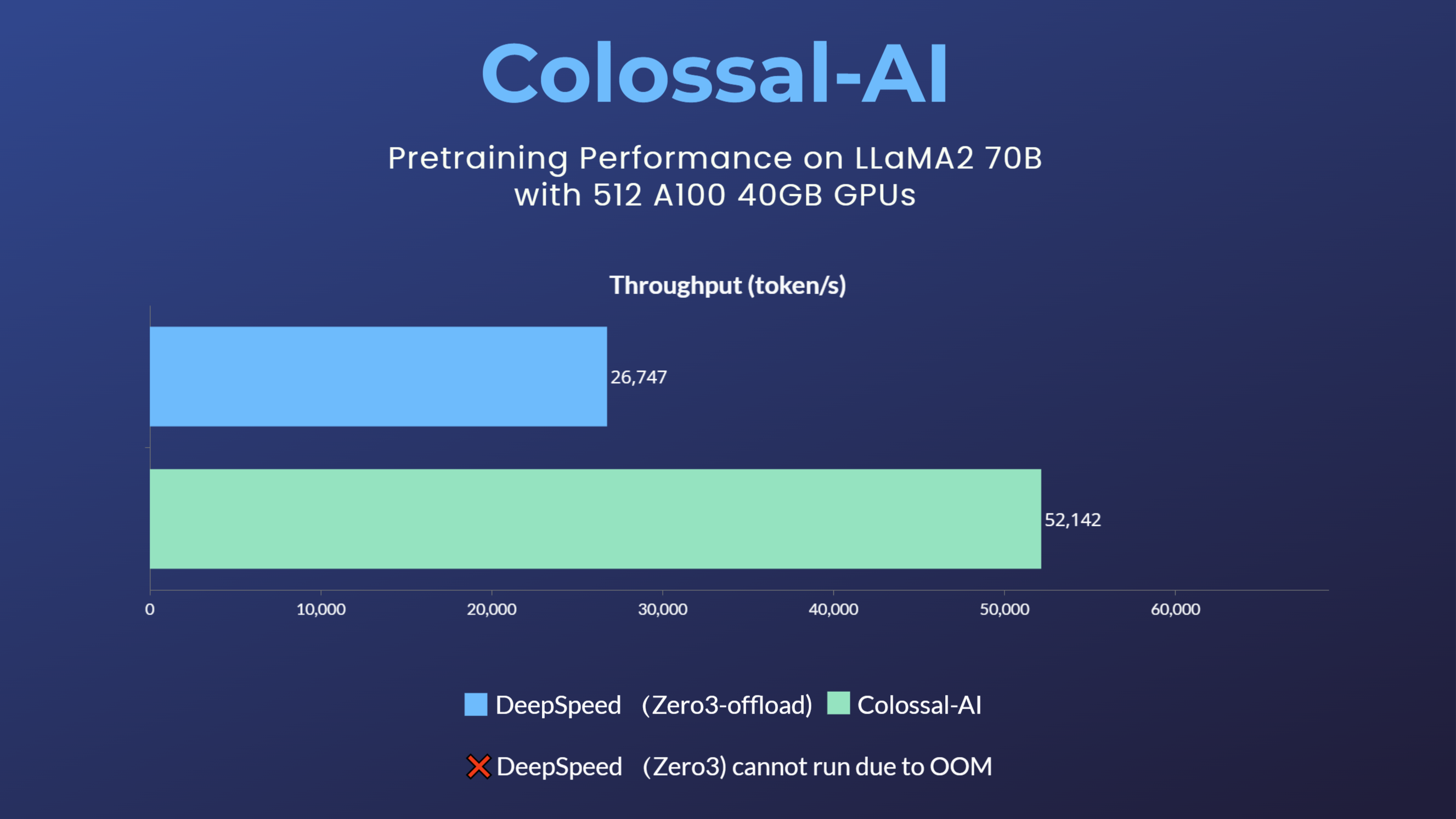
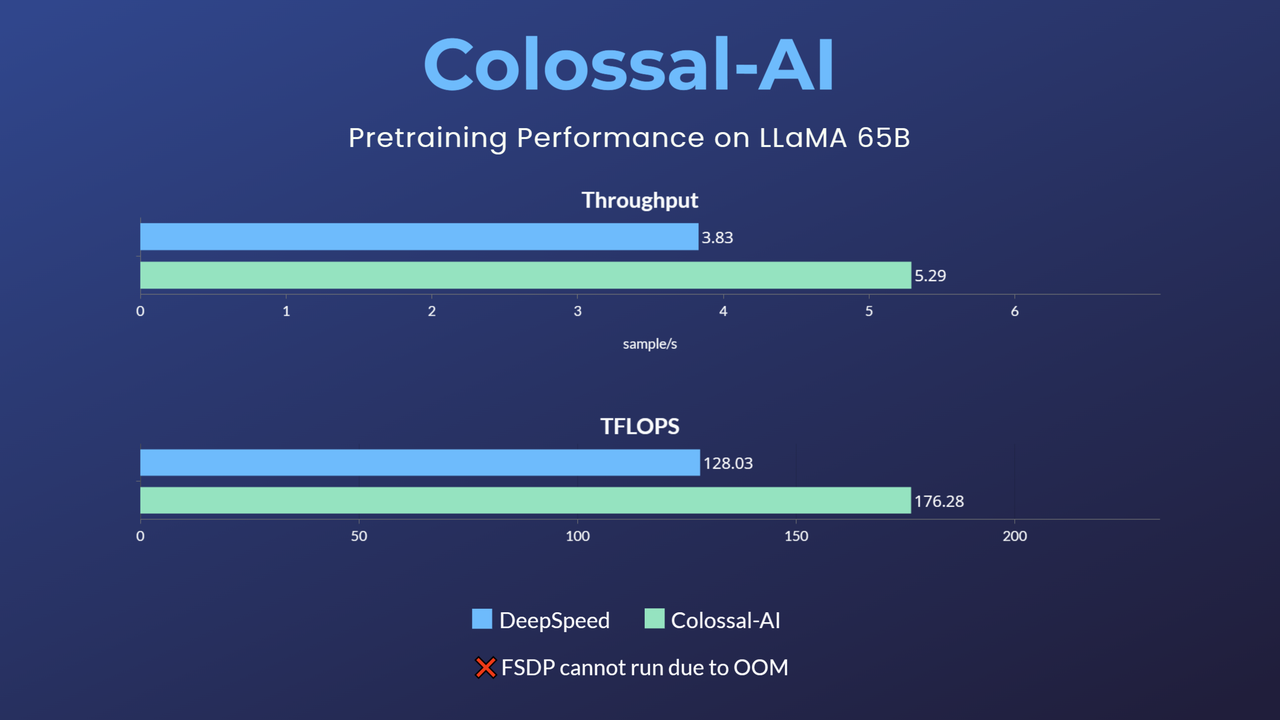

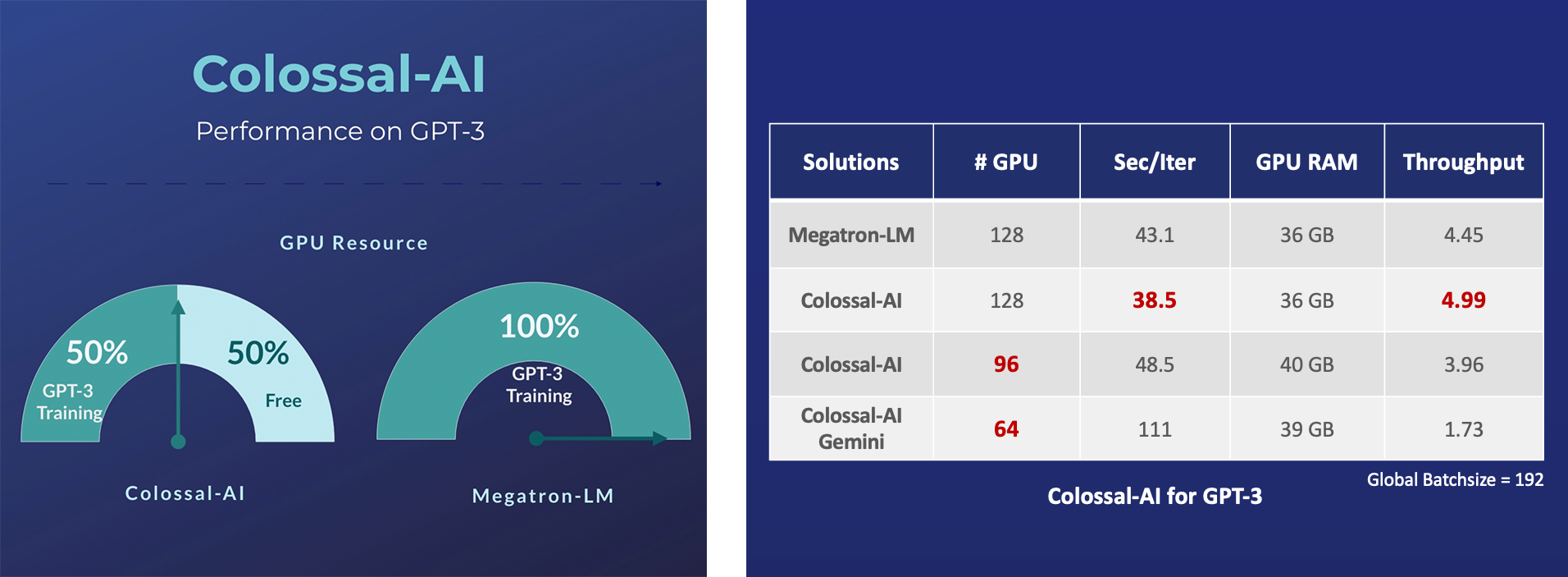

GPT-2.png)


Please visit our documentation and examples for more details.
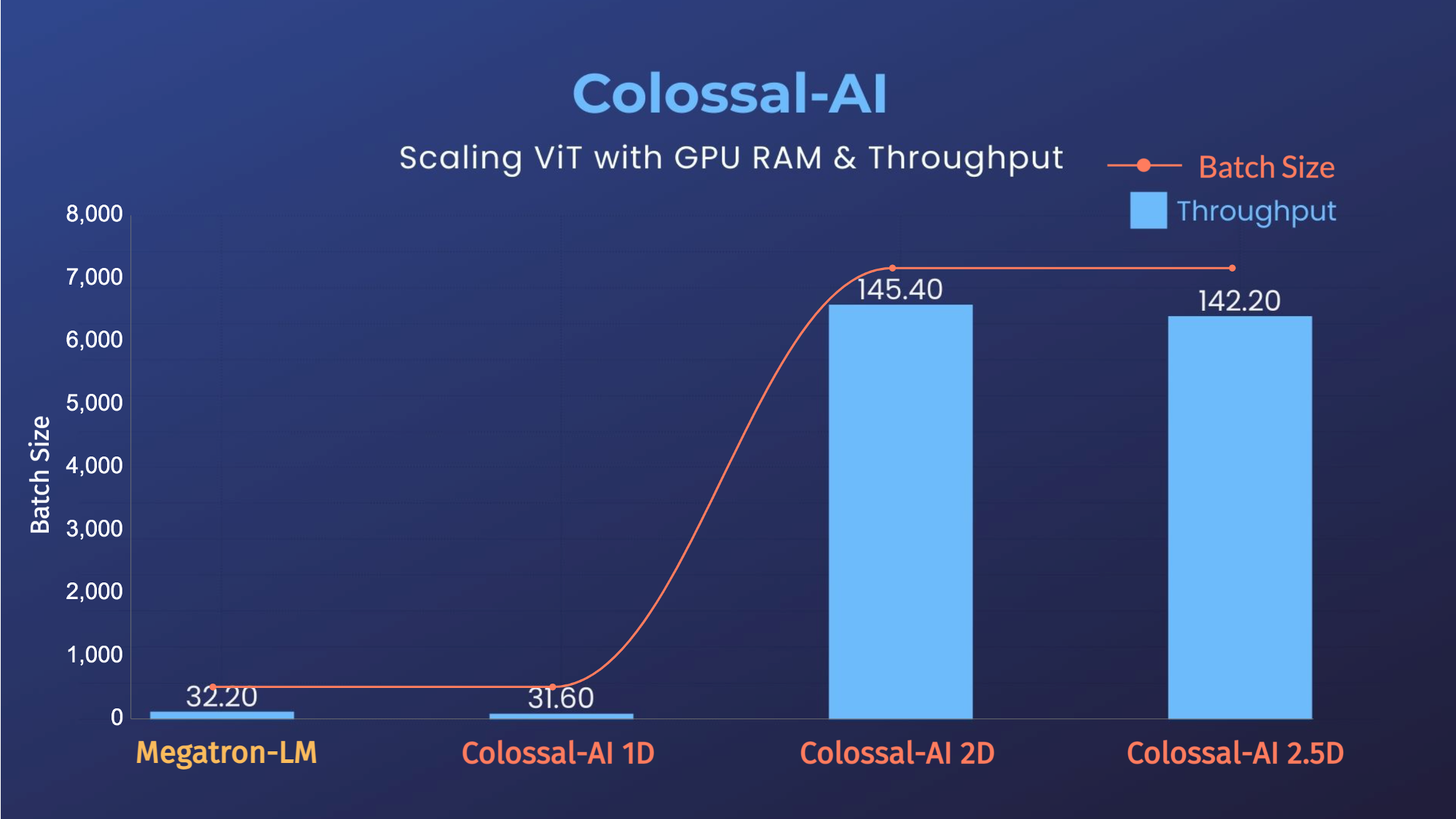
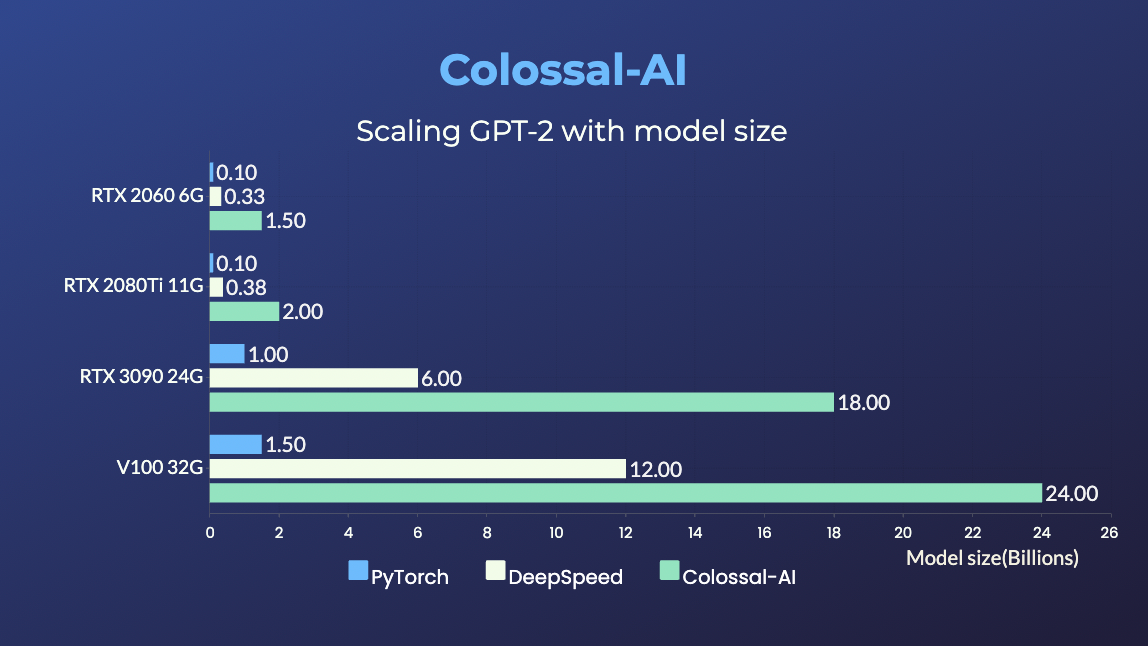

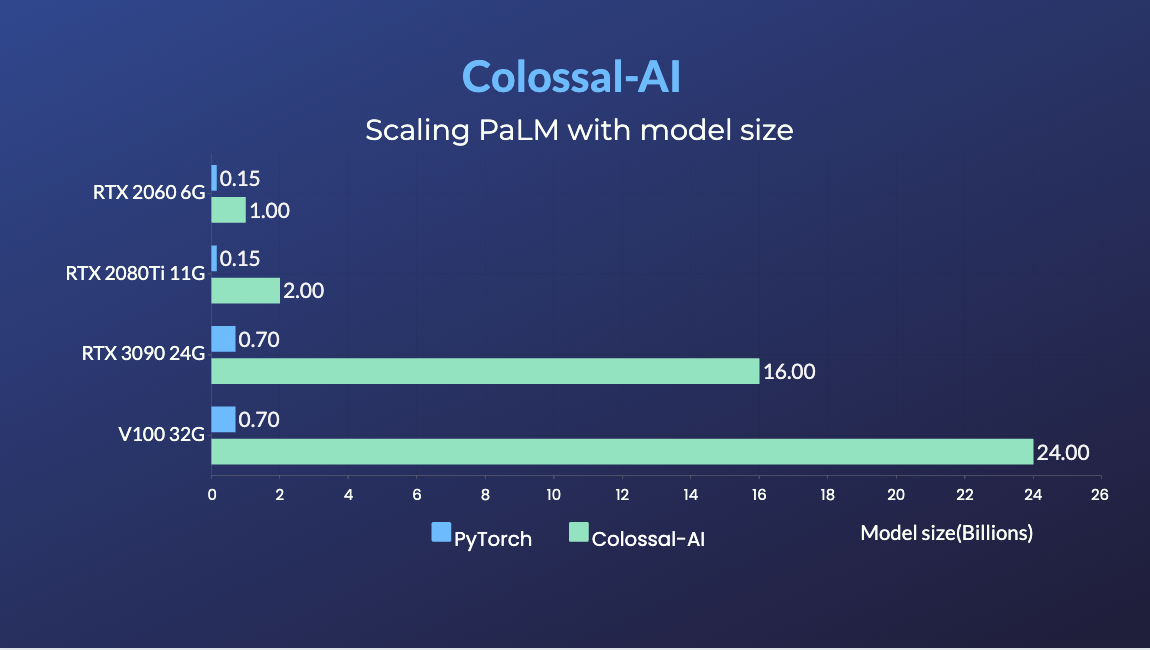


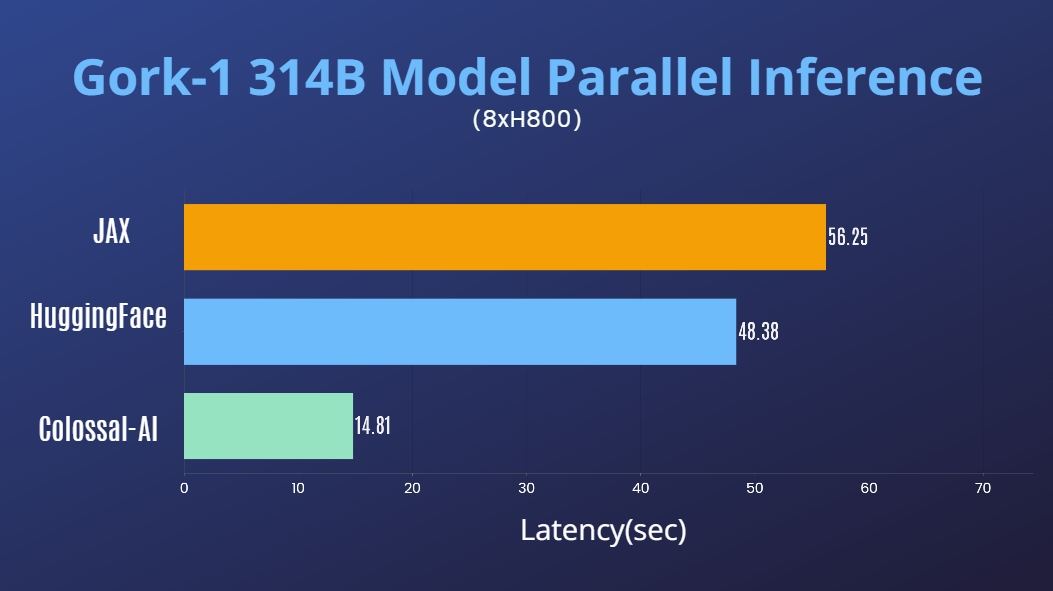
[code] [blog] [HuggingFace Grok-1 PyTorch model weights] [ModelScope Grok-1 PyTorch model weights]
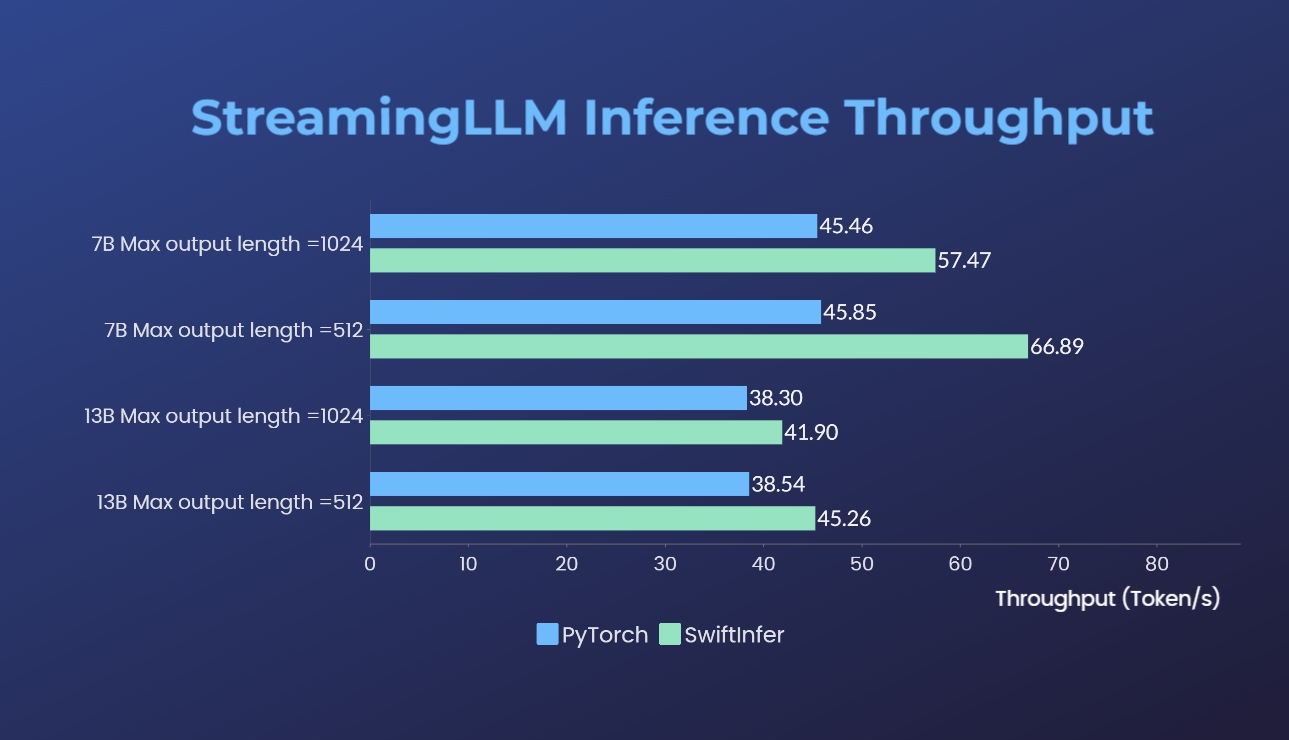
Requirements:
If you encounter any problem with installation, you may want to raise an issue in this repository.
You can easily install Colossal-AI with the following command. By default, we do not build PyTorch extensions during installation.
pip install colossalai
Note: only Linux is supported for now.
However, if you want to build the PyTorch extensions during installation, you can set BUILD_EXT=1.
BUILD_EXT=1 pip install colossalai
Otherwise, CUDA kernels will be built during runtime when you actually need them.
We also keep releasing the nightly version to PyPI every week. This allows you to access the unreleased features and bug fixes in the main branch. Installation can be made via
pip install colossalai-nightly
The version of Colossal-AI will be in line with the main branch of the repository. Feel free to raise an issue if you encounter any problems. :)
git clone https://github.com/hpcaitech/ColossalAI.git
cd ColossalAI
# install colossalai
pip install .
By default, we do not compile CUDA/C++ kernels. ColossalAI will build them during runtime. If you want to install and enable CUDA kernel fusion (compulsory installation when using fused optimizer):
BUILD_EXT=1 pip install .
For Users with CUDA 10.2, you can still build ColossalAI from source. However, you need to manually download the cub library and copy it to the corresponding directory.
# clone the repository
git clone https://github.com/hpcaitech/ColossalAI.git
cd ColossalAI
# download the cub library
wget https://github.com/NVIDIA/cub/archive/refs/tags/1.8.0.zip
unzip 1.8.0.zip
cp -r cub-1.8.0/cub/ colossalai/kernel/cuda_native/csrc/kernels/include/
# install
BUILD_EXT=1 pip install .
You can directly pull the docker image from our DockerHub page. The image is automatically uploaded upon release.
Run the following command to build a docker image from Dockerfile provided.
Building Colossal-AI from scratch requires GPU support, you need to use Nvidia Docker Runtime as the default when doing
docker build. More details can be found here. We recommend you install Colossal-AI from our project page directly.
cd ColossalAI
docker build -t colossalai ./docker
Run the following command to start the docker container in interactive mode.
docker run -ti --gpus all --rm --ipc=host colossalai bash
Join the Colossal-AI community on Forum, Slack, and WeChat(微信) to share your suggestions, feedback, and questions with our engineering team.
Referring to the successful attempts of BLOOM and Stable Diffusion, any and all developers and partners with computing powers, datasets, models are welcome to join and build the Colossal-AI community, making efforts towards the era of big AI models!
You may contact us or participate in the following ways:
Thanks so much to all of our amazing contributors!
We leverage the power of GitHub Actions to automate our development, release and deployment workflows. Please check out this documentation on how the automated workflows are operated.
This project is inspired by some related projects (some by our team and some by other organizations). We would like to credit these amazing projects as listed in the Reference List.
To cite this project, you can use the following BibTeX citation.
@inproceedings{10.1145/3605573.3605613,
author = {Li, Shenggui and Liu, Hongxin and Bian, Zhengda and Fang, Jiarui and Huang, Haichen and Liu, Yuliang and Wang, Boxiang and You, Yang},
title = {Colossal-AI: A Unified Deep Learning System For Large-Scale Parallel Training},
year = {2023},
isbn = {9798400708435},
publisher = {Association for Computing Machinery},
address = {New York, NY, USA},
url = {https://doi.org/10.1145/3605573.3605613},
doi = {10.1145/3605573.3605613},
abstract = {The success of Transformer models has pushed the deep learning model scale to billions of parameters, but the memory limitation of a single GPU has led to an urgent need for training on multi-GPU clusters. However, the best practice for choosing the optimal parallel strategy is still lacking, as it requires domain expertise in both deep learning and parallel computing. The Colossal-AI system addressed the above challenge by introducing a unified interface to scale your sequential code of model training to distributed environments. It supports parallel training methods such as data, pipeline, tensor, and sequence parallelism and is integrated with heterogeneous training and zero redundancy optimizer. Compared to the baseline system, Colossal-AI can achieve up to 2.76 times training speedup on large-scale models.},
booktitle = {Proceedings of the 52nd International Conference on Parallel Processing},
pages = {766–775},
numpages = {10},
keywords = {datasets, gaze detection, text tagging, neural networks},
location = {Salt Lake City, UT, USA},
series = {ICPP '23}
}
Colossal-AI has been accepted as official tutorial by top conferences NeurIPS, SC, AAAI, PPoPP, CVPR, ISC, NVIDIA GTC ,etc.
FAQs
An integrated large-scale model training system with efficient parallelization techniques
We found that colossalai-nightly demonstrated a healthy version release cadence and project activity because the last version was released less than a year ago. It has 1 open source maintainer collaborating on the project.
Did you know?

Socket for GitHub automatically highlights issues in each pull request and monitors the health of all your open source dependencies. Discover the contents of your packages and block harmful activity before you install or update your dependencies.

Security News
Research
The Socket Research Team breaks down a malicious wrapper package that uses obfuscation to harvest credentials and exfiltrate sensitive data.

Research
Security News
Attackers used a malicious npm package typosquatting a popular ESLint plugin to steal sensitive data, execute commands, and exploit developer systems.

Security News
The Ultralytics' PyPI Package was compromised four times in one weekend through GitHub Actions cache poisoning and failure to rotate previously compromised API tokens.